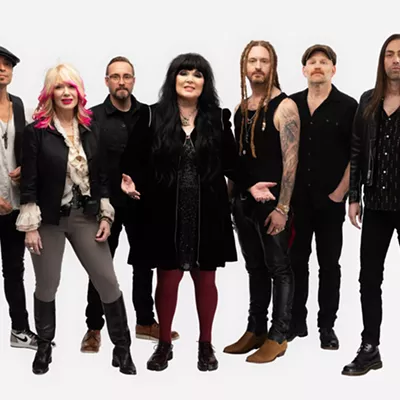Musicians tend to soften with age. It's the natural way of things. Bands usually start as collectives of friends with fires in their bellies, but as time passes there tends to be less fire and more indigestion in said tummies. Vocal chords that once effortlessly bellowed grow worn and frayed by years of borderline abuse on the road. There's just a general energy drain for most musicians the further they get from the start of their careers.
Cursive is the exception that proves the rule. Since starting out in Omaha, Nebraska, in 1995, the band led by singer/guitarist/songwriter Tim Kasher has carved a path that's closer to progressive escalation than slow decline. The group broke into the national conversation in a real way with its third LP, 2000's Domestica, an album that would soon become a touchstone of Second Wave emo. The weird part of that is how little Cursive actually fits any sort of label, emo or otherwise. Take for example the group's 2003 follow-up The Ugly Organ, which is also a landmark classic, but more for the indie rockers. It's a testament to the band that you could probably give a new listener any of Cursive's last seven albums, and it wouldn't be instantly clear what order they came out in. The group's cello-laden post-hardcore sound is not only hard to pin down, but things keep getting sonically harder. And that's certainly the case for Cursive's 10th and latest album, 2024's Devourer.
"As a music appreciator and as a musician, I've kind of gone the opposite direction that I think we all expect us to do when we get older. I kind of got into heavier music older," Kasher says. "When I was younger, I really grew up on Britpop and stuff like that. And then, you know, I had a dalliance with Iron Maiden and Metallica — just kind of skimming the top of metal. And then I got older, and I just kind of got a lot more interested in it, and I see it reflected in the last 15 years of what I was doing with Cursive. I'm not saying that Cursive ever became a metal band, but it just kind of became heavier and darker. And as a fan of that kind of music, that works for me."
An argument could be made that Devourer is Cursive's fiercest album yet with Kasher and company wailing through track after track of delightfully heavy riffs and subject material. The album-opening "Botch Job" gets the teeth out early as the tune lyrically bemoans life not feeling like how you once dreamed it'd be. It's followed by the album's most melodic moments as "Up and Away" boasts a cheekily bubbly pop chorus that's counterbalanced by an underlying dissonance centered on endless disappointments. Other tracks like "What the F—" thrash with pure existential angst. Instrumentally, things lean to almost headbanger levels at times (even going with a two-drummer approach on "Rookie"), with Megan Siebe's cello almost serving as a comfort blanket for when things get really gnarly.
"I guess one of the MOs that I had for this record was to bring eclecticism back to our records — in no way to dissing our last three records," Kasher says. "The pandemic was a time where we all had a lot of time on our hands. It afforded me the opportunity to have so little to do that I listened back to every record I've ever done. It helped give me a little bit of scope about what Cursive was and what Cursive became. Listening through the whole catalog, it just kind of reminded me that Cursive is a lot more broad. It used to be so important to us to not fit into [any] genre, and one of the things I wanted to do with this record was kind of get back to that more eclectic approach, where there can be a wider, broader spectrum of styles on one record."
When struggling to name the new LP, Kasher's mind began to drift toward thoughts he had about being both a consumer and maker of pop culture.
"Thematically, [the album] is not really about pop culture consumption so much, but that is where the name derived from," Kasher says. "I had been thinking about the word devourer and how that's just kind of what I am and so many of us are, just a devourer of the arts. Daily, I'm consuming as much as I can, getting excited about trying to find something that truly resonates. But then in turn, I go and kind of shit all that out. I hope that those influences are never really on my sleeve, because I don't like to have over-influence. But what the f---? Of course, we're all being influenced by everything! I mean, I'll be influenced by this conversation for something, you know?"
The title Devourer could also be applied in terms of Kasher's contemplative lyrical views on the consumerist society that we are all living through. "The Avalanche of Our Own Demise" basically just asks the musical question of if we'll notice when the apocalypse begins (or if it already started). "What Are We Gonna Do Now" takes sharp-tongued aim at privilege, while "Dead End Days" delivers a synth-heavy screed against a broken society.
"We've always kind of gone with the stance that we're not a political band," Kasher says. "But then, if you stack us up against most bands, we're very political. [Laughs] So in my head, there are political bands where that's their agenda. And I think that's cool. And I guess there's a part of me that wants that, because I feel like it's important and it's helpful, and you're including yourself into the larger conversation. But at the end of the day, I always prefer to just do what's best for the song and for what's best for the album."
There is also the borderline requisite Cursive staple of Kasher having wildly self-critical tunes that attempt to lay bare all the ugly navel-gazing side of being a musician. This time the railing against creatures' toxic nature comes via "Imposturing." Even after decades of Kasher publicly calling out his ego through songs, he still is more comfortable laying in those thorny fields.
"I keep a journal, but I only write in it about once or twice a month. Just to recap, this was going on lately," Kasher says. "And for 2025 I was like, 'Why don't you do a daily one? You might look back and really appreciate all that documentation.' So Jan. 1 rolls around, and I'm like, 'Alright, get started.' And I just sat there, like, 'Honestly, this is just a very normal day. Nothing's really going on. You're gonna be so bored by this. What are you writing about?'
"That's my long-winded example of saying that when things are just fine and things that are just going well — who writes about that?" Kasher continues. "With Cursive, that's something that we started with back in the mid-'90s when we started the band. I felt like as a band, it should always be pushing ideas and questioning things. And that's kind of where it has continued to land. While that comes out as pessimism and as more of a morose attitude, that's because that lives within us, even if it's not outwardly to what we're experiencing or what we're projecting. That's what I find most interesting as a writer."
Cursive returns to town Feb. 3 for what's sure to be a rowdy show at The District Bar. As the band's 2023 visit to Lucky You Lounge as part of the 20th anniversary tour for Domestica proved, the band still completely throws a fastball when it comes to whipping its fans into a frenzy. Even if the original devotees have grown out of the moshing age, it's hard not to want to match Cursive's ageless edge. ♦
Cursive, Pile • Mon, Feb. 3 at 9 pm • $25 • 21+ • The District Bar • 916 W. First Ave. • sp.knittingfactory.com


























